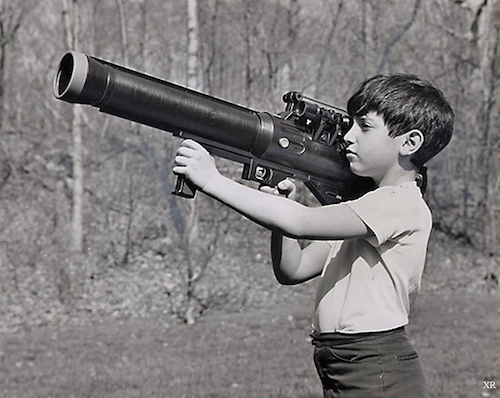We run our website the way we wished the whole internet worked: we provide high quality original content with no ads. We are funded solely by your direct support. Please consider supporting this project.

Should Christians Arm Themselves?
Jerry Falwell Jr, the president of Liberty University, recently encouraged the students to arm themselves saying, “I always thought that if more good people had concealed-carry permits, then we could end those Muslims before they walk in and kill.” In the light of Christ’s teaching, what should be our response?
First, the NT is quite clear, commanding us never to “repay anyone evil for evil,” but instead to overcome evil with good” (Rom 12:17; 21). Jesus said, “Love your enemies, do good to those who hate you, bless those who curse you, pray for those who abuse you (Lk 6:27-28).
At the same time, we have to admit that it’s hard to take this teaching seriously when it comes to extreme situations. Not only would most of us resist the evildoer, even killing if necessary, but most of us would see it as immoral if we didn’t use violence to resist such an evildoer.
This presents us with a dilemma. Isn’t it more loving, and thus more ethical, to protect yourself and others from such evil acts?
Jesus said, “Do not resist an evildoer. But if anyone strikes you on the right cheek, turn the other also” (Matt 5:39). It helps somewhat to remember that the word Jesus uses for “resist” (antistenai) doesn’t imply passively allowing something to take place. It rather connotes resisting a forceful action with a similar forceful action. Jesus is thus forbidding responding to violent action with similar violent action. He’s teaching us not to take on the violence of the one who is acting violently toward us. He’s teaching us to respond to evil in a way that is consistent with loving them.
Everybody instinctively hates those who hate them and believes they are justified in killing people who might kill them. But the whole point of Jesus’ teaching is to tell disciples that their attitude toward “enemies” should be radically different.
Jesus’ teaching aren’t a set of pacifistic laws people are to merely obey. Rather, his teachings are descriptions of what life in God’s domain looks like and prescriptions for how we are to cultivate this alternative form of life. He’s not saying “Act loving toward your enemy even though you want to kill him.” He’s rather saying, “Cultivate the kind of life where loving your enemy becomes natural for you.”
A person who lives within the normal tit-for-tat kingdom-of-the-world mindset would instinctively resort to violence to protect himself. But how might a person who cultivated a nonviolent, kingdom-of-God mindset respond?
For one thing, such a person would have cultivated a kind of character and wisdom that wouldn’t automatically default to self-protective violence. Rather, this person would see nonviolent alternatives if they were present. This person’s discipleship in love would have given him wisdom that a person whose mind was conformed to the pattern of the tit-for-tat world would not have.
Not only this, but this person’s day-by-day surrender to God would cultivate a sensitivity to God’s Spirit that would enable him to discern God’s leading in the moment, something the “normal” kingdom-of-the-world person would be oblivious to. This Christlike person might be divinely led to say something or do something that would disarm the attacker emotionally, spiritually, or even physically.
In addition, a person who has cultivated a kingdom-of-God outlook on life would have developed the capacity to assess this situation from an eternal perspective, embracing the truth that living in love is more important than life itself. This person would have cultivated a trust in God that would free her from defining winning and losing in terms of temporal outcomes.
What we must never do is acquiesce to our worldly condition by rationalizing away Jesus’ clear kingdom prescriptions. We must rather strive every moment of our life to cultivate the kind of mind and heart that increasingly sees the rightness and beauty of Jesus’ teachings and thus would naturally respond to an extreme, threatening situation in a loving, nonviolent manner.
—Adapted from The Myth of a Christian Nation, pages 162-167
Photo credit: x-ray delta one / Visualhunt / CC BY-NC-SA
Category: General
Tags: Current Events, Discipleship, Guns, Jerry Falwell Jr, Non-Violence
Related Reading

On the Language of “Revolution”
Nick Thompson via Compfight Question: The banner of your website and the thrust of much of your teaching focuses on “revolution.” While I can see a radical call in some of the sayings of Jesus, especially if he were addressing upper-middle class North Americans, I wonder if attaching revolutionary language to his teaching seems a…

McChurch
In the West, we tend to think of church as a weekend gathering in a special religious building. As a result, many mistakenly assume that Paul wrote his letters to a single body of people in a specific town who gathered together as a rather large group once a week. In reality, the regional churches…

Is Spanking Okay?
Given Greg’s stance on non-violence, I thought it would be interesting to know his thoughts on spanking. Proverbs 13:24 “Whoever spares the rod hates their children, but the one who loves their children is careful to discipline them.” Links: http://traffic.libsyn.com/askgregboyd/Episode_0008.mp3

How Do You Balance Productivity and Spiritual Health?
In this episode Greg talks about balancing a productive life with a spiritually healthy one. Links: Book: Seeing is Believing http://traffic.libsyn.com/askgregboyd/Episode_0019.mp3

Does the Old Testament Justify “Just War”?
Since the time of Augustine, Christians have consistently appealed to the violent strand of the Old Testament to justify waging wars when they believed their cause was “just.” (This is Augustine’s famous “just war” theory.) Two things may be said about this. First, the appeal to the OT to justify Christians fighting in “just” wars…

Why Did Jesus Curse a Barren Fig Tree?
While no one argues that the NT advocates violence explicitly, many allege that some passages reflect violent attitudes toward outsiders, and especially toward non-believing Jews, while others detect an element of violence in some of Jesus’ teachings and behavior. Some scholars argue that this violent aspect of the NT laid the groundwork for later Christian…
